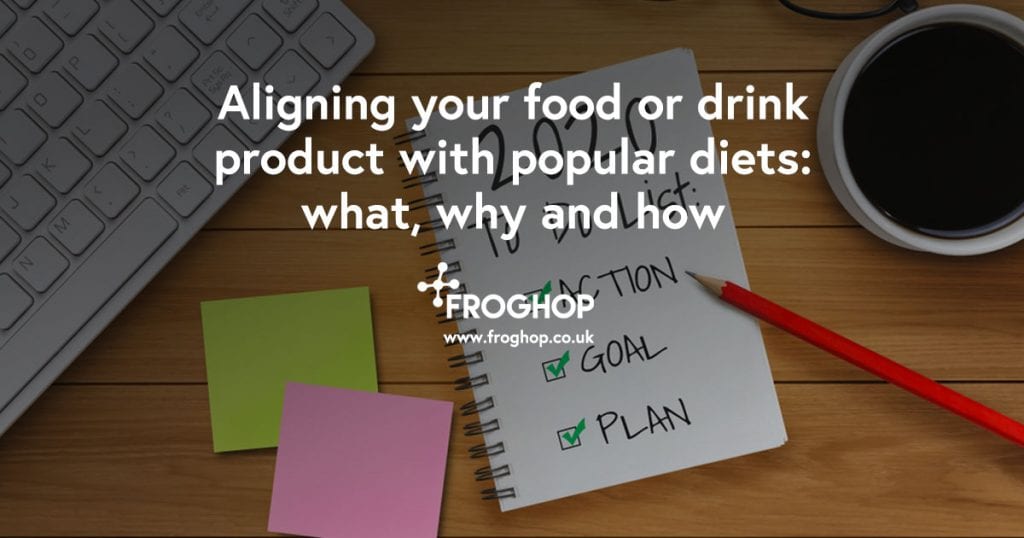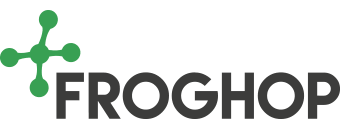For many of us January brings a renewed focus on our health and diet. For food producers this creates an opportunity to your food or drink product to specific diets and capitalise on their popularity. We’ve had a look at 2020’s most popular diets to give you some ideas of how to align your product their specific needs.
2020’s most popular diets
Aligning with a diet approach can be a way to stand out and gain customers, especially when an approach isn’t already well-served with ready-to-eat products (e.g. ketogenic). We’ve seen customers’ sales have go supernova because they’ve been included in the app or database of suitable foods for a particular diet. So let’s look at 2020’s most popular diets and examine how producers can adapt their food and drink products to support dieters.
Ketogenic (Keto)
A low carb, high fat diet, going ketogenic has become very popular in recent years but it is restrictive. If a consumer would rather not cook from scratch, there’s very little in the way of keto-compatible ready meals and products. Many diets, including this one, put the focus on macro nutrients (i.e. fat, carbs, protein) and it’s easy to overlook micro-nutrient content. Producers offering this can enhance a specific diet by filling this gap.
Pegan
A newcomer on the scene, pegan combines elements of paleo and veganism. As a reminder, paleo is reminiscent of an ancestral, cave-man diet involving meat, fish, fruit, veg and nuts. Where it meets veganism is in its requirement to eat 75% fruit and veg with meat as a side rather than a key feature.
People following this diet (and typically vegans too) can miss out on the nutrients often provided by dairy such as B12 and calcium. However, it’s possible to source vegan alternatives to help support their diet. Food producers might look at providing nutrient-dense pegan-friendly products to complement this.
Noom
Noom is a weight-loss and meal planning app targeted at millennials. With more than 45 million users, it was one of the most Googled diets in 2019. While it doesn’t cut out specific food groups, it has a traffic-light style classification system which labels vegetables, fruit and legumes as green; low-fat cheese and meat as yellow and processed foods and alcohol as red. Customers are encouraged to eat more green.
Aligning your product with Noom’s colour classifications and getting your product into the app’s database (which users can add themselves) can dramatically boost your sales.
Mindful eating
Mindfulness as a concept is now very much part of the modern vernacular and is now increasingly being applied to eating. Mindfulness for the uninitiated is the practice of focusing on the present moment, without judgement, and engaging with the senses. The application of mindfulness to food involves examining and smelling what’s on your plate and then eating slowly, focusing on each mouthful. Mindful eating encourages consumers to listen to the body’s signals of hunger and fullness rather than reaching for food when bored or emotional.
For food producers this approach is about the need to maximise the quality of ingredients and sensory aspects of your product. Food with taste, texture and aroma will be more enjoyable to eat and, so goes the mindful eating theory, more satisfying.
Huel
Vegan and sourced ethically, Huel is a meal replacement system of powders, drinks and bars. Their marketing and branding approach is particularly interesting. Firstly, they are targeting men and have a fresh take on the product and the category. They’ve added texture to the traditional meal replacement powder by including oats and more.
Meal replacement products are strongly regulated and there are legal requirements for their nutritional profile. It’s clear Huel have worked hard to achieve them while improving the taste and texture of their product – as well as following a clean label approach.
Evidently, there are opportunities for enterprising food producers to complement the 2020’s most popular diets. It can certainly be a challenge to create suitable products but there’s significant market opportunity if you do.

